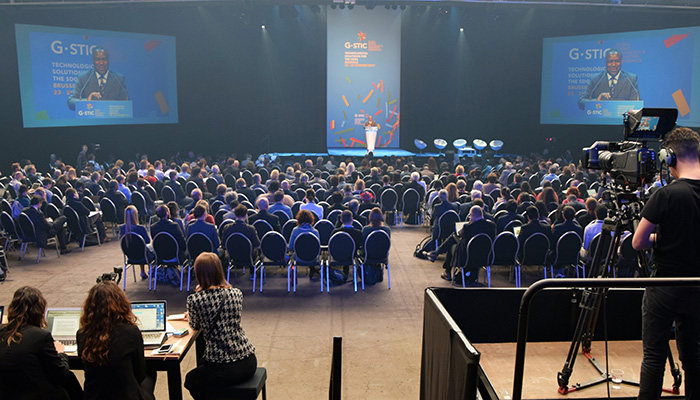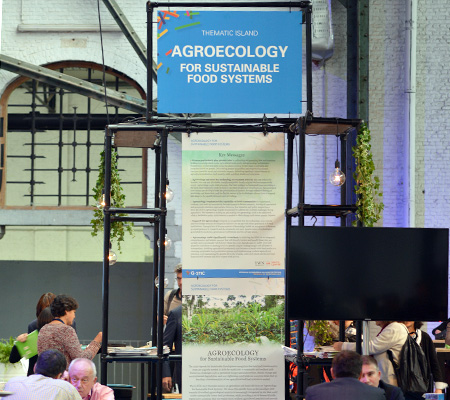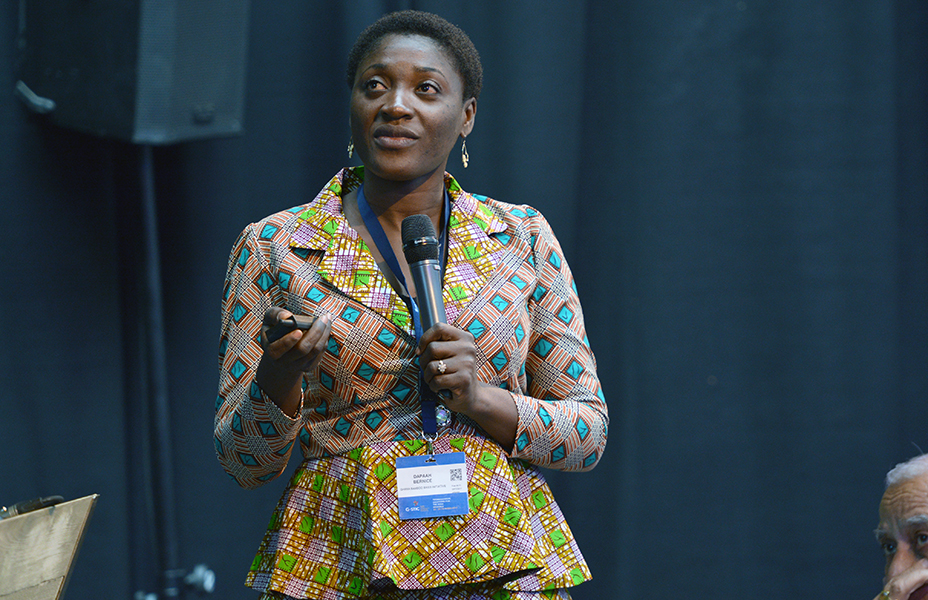23-25 October 2017. Brussels, Belgium. G-STIC 2017: The first Global Science, Technology and Innovation Conference series.
G-STIC 2017, the first in series of annual conferences, aimed at identifying and promoting market-ready, innovative technological solutions needed to achieve the SDGs – implementable solutions that are scalable and sustainable both from a societal and economic perspective.
G-STIC 2017 focused on integrated solutions that work across disciplines and sectors, and assessed how to accelerate and make more effective their deployment to help resolve the myriad of challenges that lie ahead.
G-STIC 2017 comes at “a critical and timely moment” by pointing to ways to scale up technological innovations and taking up the challenge of linking with policymakers who can facilitate the fast adoption of these technologies. Kennedy Orwa, African Centre for Technology Studies,
Agro-ecology session
Agriculture is increasingly challenged by climate change and environmental degradation, by population growth and urbanisation, and by ever tightening constraints on resources (land, water, farmers, energy) – especially in developing countries. To enable a substantially higher food production that meets the demands of 9 billion people by 2050 and to do this with far less resources than available today, there is a need to acquire and adopt innovations on a global scale. These should help accelerate agriculture’s capacity to provide higher and more resilient incomes for local communities and to deliver safe, nutritious and sufficient food for all at all
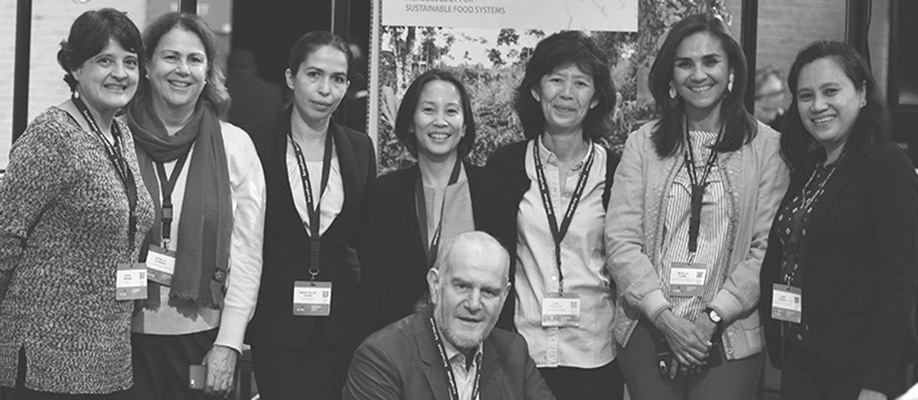 |
| Participants in the Agroecology for Sustainable Food Systems session |
times of the year.
This theme explored how sustainable food production systems of small farms in developing countries can handle this challenge through natural and balanced agro-ecological approaches. The incorporation of such approaches is full of challenges itself but is vital to delivering a set of small-scale, farmer-friendly and resource-efficient solutions that can realize more resilient agricultural practices and provide populations with access to sufficient and healthy food under changing climate
conditions.
Session 1: Agroecology for sustainable food systems

Session 2: Complementary technologies and approaches to support smallholders, family
farming and indigenous communities
Session 3: Scaling up agroecology
Final debate and conclusions
Topical session ‘Bamboo’
Bamboo is a strategic tool with over 10,000 known uses. It can help us restore landscapes, mitigate
and adapt to climate change, reduce poverty, construct safe buildings and provide a source of renewable energy. In China alone, the bamboo sector employs almost 10 million people and has an annual worth of US$ 30 billion. The objective of this bamboo session was to provide a policy-focused dialogue on how bamboo innovations can help companies, communities and governments to meet a range of different goals.
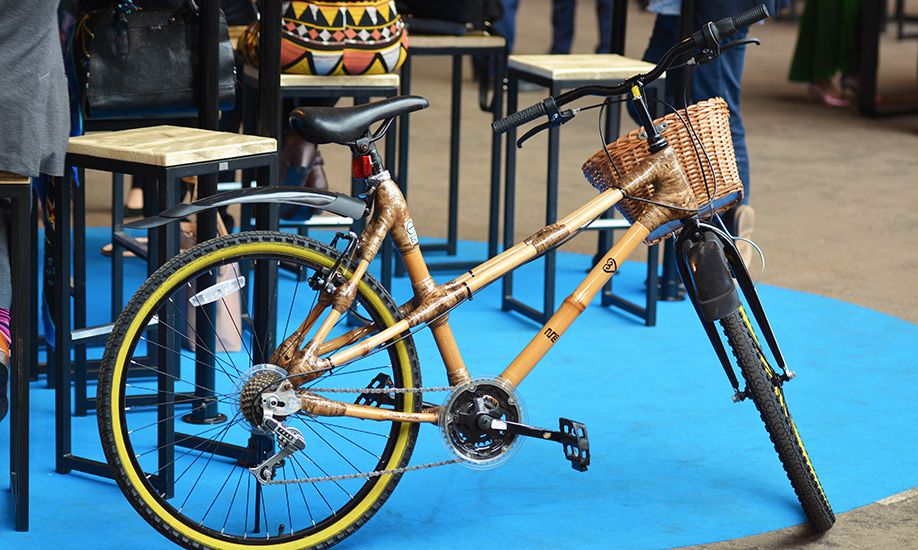

G-STIC 2017 has provided deep insights, in particular paying attention to underserved and
marginalized communities, and has identified holistic solutions that can be applied now and work for small scale farmers and rural households as well as multi-nationals and start-ups The discussions highlighted that, to realise these technological opportunities, we need to break down institutional barriers, revisit established concepts, change laws, regulations and habits.
Above all, it is vital to work across sectors, to promote new business models and value chains, to demonstrate how the combination of integrated solutions and new business models works, and rethink local, national and global policy making. That requires commercial and political leadership to advocate and make the changes that are good for people, planet and prosperity.
*** Interview with HEM Ms. Nkandu Luo, Minister of Higher Education from Zambia @ 1:32
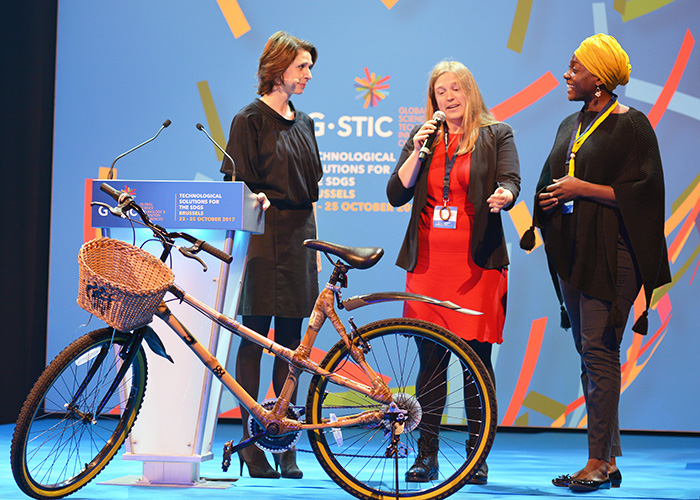 |
| Bernice Dapaah, Ghana, presented her bamboo bike to Louise De Tremerie, a PhD student from Ghent |
In addition to focusing on integrated technological solutions that have the potential to substantively contribute to achieving the SDGs, G-STIC 2017 has also addressed 4 aspects that are of fundamental importance to the SDGs: Gender mainstreaming, youth engagement, climate and ICT.
 |
|
Dessima Williams , UN Special Adviser for
Implementation of the Sustainable Development Goals
|
 |
|
Elioda Tumwesigye, Minister of Science,
Technology and Innovation, Uganda
|
Winner of the reseach challenge: Forward-thinking humanitarian response in urban contexts (refugee settlements) by Ang Jia Cong (UN-Habitat, Kenya)
Source: PAEPARD FEED
by secretary
by secretary
by secretary
by secretary
by secretary
by secretary
by secretary
by secretary
by secretary
by secretary
by secretary
by secretary
by secretary
by secretary
by secretary
by secretary
by secretary
by secretary
by secretary
by secretary
by secretary
by secretary
by secretary
by secretary
by secretary
by secretary
by secretary
by secretary
by secretary
by secretary
by secretary
by secretary
by secretary
by secretary
by secretary
by secretary
by secretary
by secretary
by secretary
by secretary
by secretary
by secretary
by secretary
by secretary
by secretary
by secretary
by secretary
by secretary
by secretary
by secretary
by secretary
by secretary
by secretary
by secretary
by secretary
by secretary
by secretary
by secretary
by secretary
by secretary
by secretary
by secretary
by secretary
by secretary
by secretary
by secretary
by secretary
by secretary
by secretary
by secretary
by secretary
by secretary
by secretary
by secretary
by secretary
by secretary
by secretary
by secretary
by secretary
by secretary
by secretary
by secretary
by secretary
by secretary
by secretary
by secretary
by secretary
by secretary
by secretary
by secretary
by secretary
by secretary
by secretary
by secretary
by secretary
by secretary
by secretary
by secretary
by secretary
by secretary
by secretary
by secretary
by secretary
by secretary
by secretary
by secretary
by secretary
by secretary
by secretary
by secretary
by secretary
by secretary
by secretary
by secretary
by secretary
by secretary
by secretary
by secretary
by secretary
by secretary
by secretary
by secretary
by secretary
by secretary
by secretary
by secretary
by secretary
by secretary
by secretary
by secretary
by secretary
by secretary
by secretary
by secretary
by secretary
by secretary
by secretary
by secretary
by secretary
by secretary
by secretary
by secretary
by secretary
by secretary
by secretary
by secretary
by secretary
by secretary
by secretary
by secretary
by secretary
by secretary
by secretary
by secretary
by secretary
by secretary
by secretary
by secretary
by secretary
by secretary
by secretary
by secretary
by secretary
by secretary
by secretary
by secretary
by secretary
by secretary
by secretary
by secretary
by secretary
by secretary
by secretary
by secretary
by secretary
by secretary
by secretary
by secretary
by secretary
by secretary
by secretary
by secretary
by secretary
by secretary
by secretary
by secretary
by secretary
by secretary
by secretary
by secretary
by secretary
by secretary
by secretary
by secretary
by secretary
by secretary
by secretary
by secretary
by secretary
by secretary
by secretary
by secretary
by secretary
by secretary
by secretary
by secretary
by secretary
by secretary
by secretary
by secretary
by secretary
by secretary
by secretary
by secretary
by secretary
by secretary
by secretary
by secretary
by secretary
by secretary
by secretary
by secretary
by secretary
by secretary
by secretary
by secretary
by secretary
by secretary
by secretary
by secretary
by secretary
by secretary
by secretary
by secretary
by secretary
by secretary
by secretary
by secretary
by secretary
by secretary
by secretary
by secretary
by secretary
by secretary
by secretary
by secretary
by secretary
by secretary
by secretary
by secretary
by secretary
by secretary
by secretary
by secretary
by secretary
by secretary
by secretary
by secretary
by secretary
by secretary
by secretary
by secretary
by secretary
by secretary
by secretary
by secretary
by secretary
by secretary
by secretary
by secretary
by secretary
by secretary
by secretary
by secretary
by secretary
by secretary
by secretary
by secretary
by secretary
by secretary
by secretary
by secretary
by secretary
by secretary
by secretary
by secretary
by secretary
by secretary
by secretary
by secretary
by secretary
by secretary
by secretary
by secretary
by secretary
by secretary
by secretary
by secretary
by secretary
by secretary
by secretary
by secretary
by secretary
by secretary
by secretary
by secretary
by secretary
by secretary
by secretary
by secretary
by secretary
by secretary
by secretary
by secretary
by secretary
by secretary
by secretary
by secretary
by secretary
by secretary
by secretary
by secretary
by secretary
by secretary
by secretary
by secretary
by secretary
by secretary
by secretary
by secretary
by secretary
by secretary
by secretary
by secretary
by secretary
by secretary
by secretary
by secretary
by secretary
by secretary
by secretary
by secretary
by secretary
by secretary
by secretary
by secretary
by secretary
by secretary
by secretary
by secretary
by secretary
by secretary
by secretary
by secretary
by secretary
by secretary
by secretary
by secretary
by secretary
by secretary
by secretary
by secretary
by secretary
by secretary
by secretary
by secretary
by secretary
by secretary
by secretary
by secretary
by secretary
by secretary
by secretary
by secretary
by secretary
by secretary
by secretary
by secretary
by secretary
by secretary
by secretary
by secretary
by secretary
by secretary
by secretary
by secretary
by secretary
by secretary
by secretary
by secretary
by secretary
by secretary
by secretary
by secretary
by secretary
by secretary
by secretary
by secretary
by secretary
by secretary
by secretary
by secretary
by secretary
by secretary
by secretary
by secretary
by secretary
by secretary
by secretary
by secretary
by secretary
by secretary
by secretary
by secretary
by secretary
by secretary
by secretary
by secretary
by secretary
by secretary
by secretary
by secretary
by secretary
by secretary
by secretary
by secretary
by secretary
by secretary
by secretary
by secretary
by secretary
by secretary
by secretary
by secretary
by secretary
by secretary
by secretary
by secretary
by secretary
by secretary
by secretary
by secretary
by secretary
by secretary
by secretary
by secretary
by secretary
by secretary
by secretary
by secretary
by secretary
by secretary
by secretary
by secretary
by secretary
by secretary
by secretary
by secretary
by secretary
by secretary
by secretary
by secretary
by secretary
by secretary
by secretary
by secretary
by secretary
by secretary
by secretary
by secretary
by secretary
by secretary
by secretary
by secretary
by secretary
by secretary
by secretary
by secretary
by secretary
by secretary
by secretary
by secretary
by secretary
by secretary
by secretary
by secretary
by secretary
by secretary
by secretary
by secretary
by secretary
by secretary
by secretary
by secretary
by secretary
by secretary
by secretary
by secretary
by secretary
by secretary
by secretary
by secretary
by secretary
by secretary
by secretary
by secretary
by secretary
by secretary
by secretary
by secretary
by secretary
by secretary
by secretary
by secretary
by secretary
by secretary
by secretary
by secretary
by secretary
by secretary
by secretary
by secretary
by secretary
by secretary
by secretary
by secretary
by secretary
by secretary
by secretary
by secretary
by secretary
by secretary
by secretary
by secretary
by secretary
by secretary
by secretary
by secretary
by secretary
by secretary
by secretary
by secretary
by secretary
by secretary
by secretary
by secretary
by secretary
by secretary
by secretary
by secretary
by secretary
by secretary
by secretary
by secretary
by secretary
by secretary
by secretary
by secretary
by secretary
by secretary
by secretary
by secretary
by secretary
by secretary
by secretary
by secretary
by secretary
by secretary
by secretary
by secretary
by secretary
by secretary
by secretary
by secretary
by secretary
by secretary
by secretary
by secretary
by secretary
by secretary
by secretary
by secretary
by secretary
by secretary
by secretary
by secretary
by secretary
by secretary
by secretary
by secretary
by secretary
by secretary
by secretary
by secretary
by secretary
by secretary
by secretary
by secretary
by secretary
by secretary
by secretary
by secretary
by secretary
by secretary
by secretary
by secretary
by secretary
by secretary
by secretary
by secretary
by secretary
by secretary
by secretary
by secretary
by secretary
by secretary
by secretary
by secretary
by secretary
by secretary
by secretary
by secretary
by secretary
by secretary
by secretary
by secretary
by secretary
by secretary
by secretary
by secretary
by secretary
by secretary
by secretary
by secretary
by secretary
by secretary
by secretary
by secretary
by secretary
by secretary
by secretary
by secretary
by secretary
by secretary
by secretary
by secretary
by secretary
by secretary
by secretary
by secretary
by secretary
by secretary
by secretary
by secretary
by secretary
by secretary
by secretary
by secretary
by secretary
by secretary
by secretary
by secretary
by secretary
by secretary
by secretary
by secretary
by secretary
by secretary
by secretary
by secretary
by secretary
by secretary
by secretary
by secretary
by secretary
by secretary
by secretary
by secretary
by secretary
by secretary
by admin
by admin
by admin
by admin
by admin
by admin
by admin
by admin
by admin

